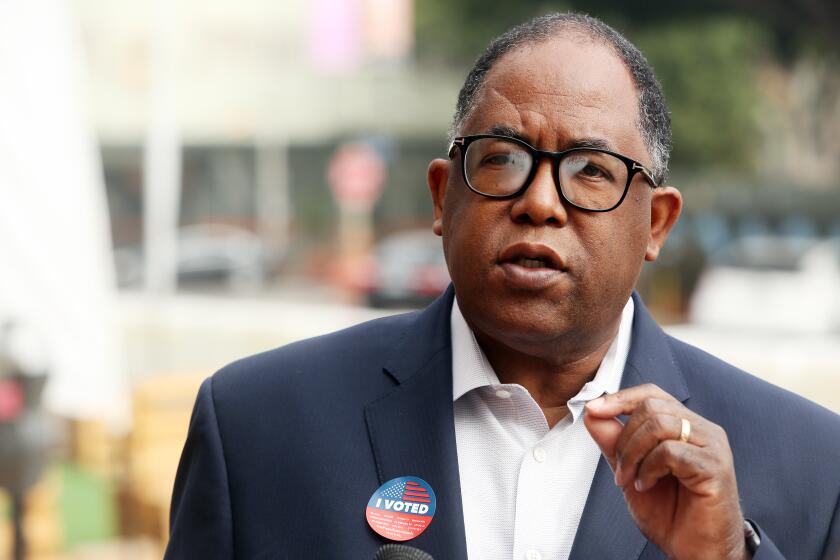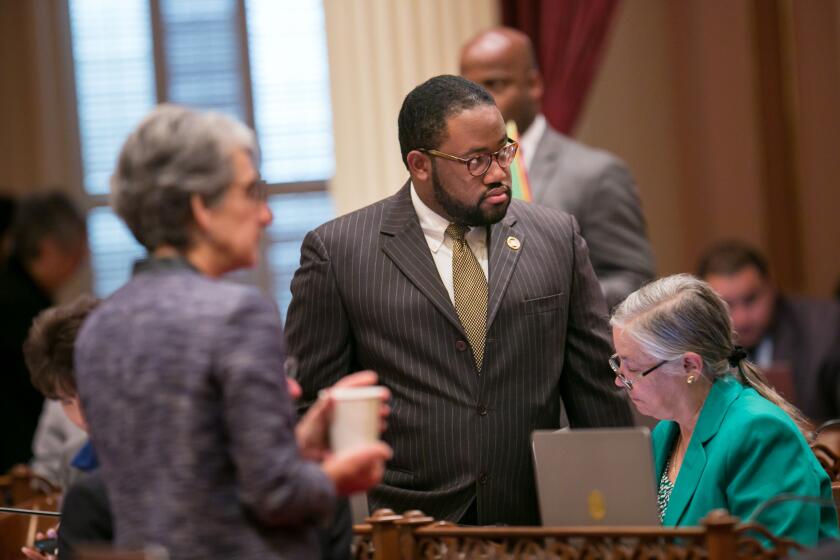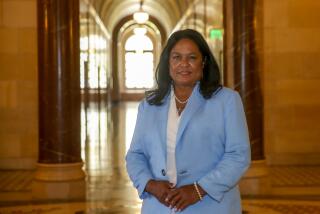Black Angelenos express mix of cynicism, disappointment after Ridley-Thomas indictment
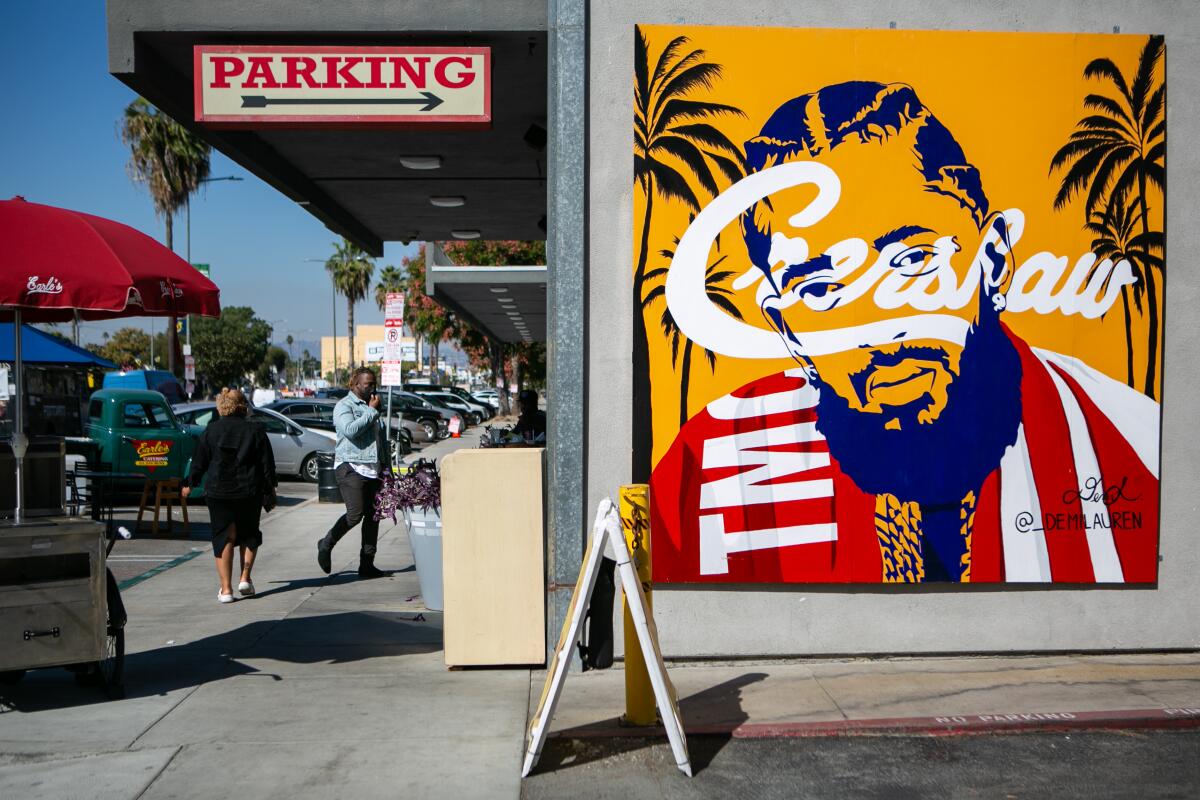
- Share via
Michael and Corey Whitted’s juice stand sits on a busy strip of Crenshaw Boulevard directly across from L.A. Councilman Mark Ridley-Thomas’ former campaign field office. A huge sign proclaiming his candidacy still looms over the block despite the office being closed.
Between serving customers Thursday, the father and son, who reside in View Park−Windsor Hills, traded thoughts on the still fresh news that Ridley-Thomas, one of the city’s best-known and longest-serving Black officials, had been indicted on federal bribery charges.
“Anytime a Black guy is a politician, as soon as he takes office, the FBI opens a file,” said Michael, the father.
“He’s a career politician, and we’re in a season of cancel culture,” mused Corey, the son. “He’s probably been feeling for a while like, ‘Damn, I hope they don’t investigate me.’”
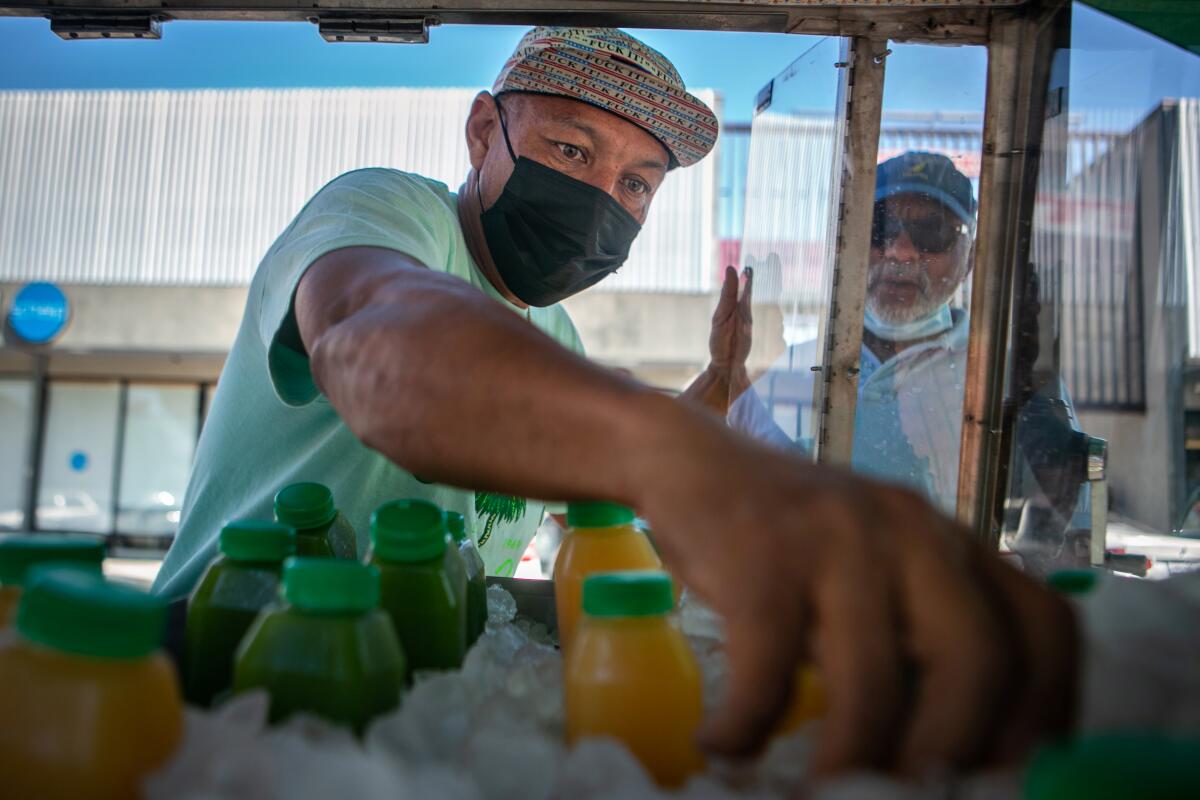
Across Council District 10 — which Ridley-Thomas represents — constituents, family, friends and longtime collaborators expressed a mix of cynicism and wariness. Beneath it all was a current of disappointment.
As Michael Whitted put it, “That’s too bad.”
A 20-count indictment accuses Ridley-Thomas and Marilyn Louise Flynn, then dean of the USC School of Social Work, of engaging in a quid pro quo deal that steered millions of dollars in L.A. County contracts to USC in exchange for the admission of Ridley-Thomas’ son Sebastian into graduate school with a full-tuition scholarship and a paid professorship.
A former USC dean is charged with paying off Mark Ridley-Thomas in exchange for millions of dollars in L.A. County contracts with the university.
The indictment also alleges that Flynn and Ridley-Thomas concocted a scheme to funnel $100,000 from one of his campaign committees through the university to a nonprofit where his son would work.
Ramona Stephens, a Baldwin Village resident, suspected a double standard and conspiracy against Ridley-Thomas as one of the few remaining Black power brokers and an agitator on contentious issues including homelessness, housing affordability and economic development.
“This kind of stuff isn’t new; it’s called nepotism, but they’re going to always put a roadblock up for any Black politician that’s trying to do something positive for the community,” Stephens said just after a trip to the post office.
“I’m not shocked by this,” she added. “But I am just watching to see how all of this plays out because we have Karen Bass, a Black woman, running for mayor now. Does this make it harder for her? I hope not.”
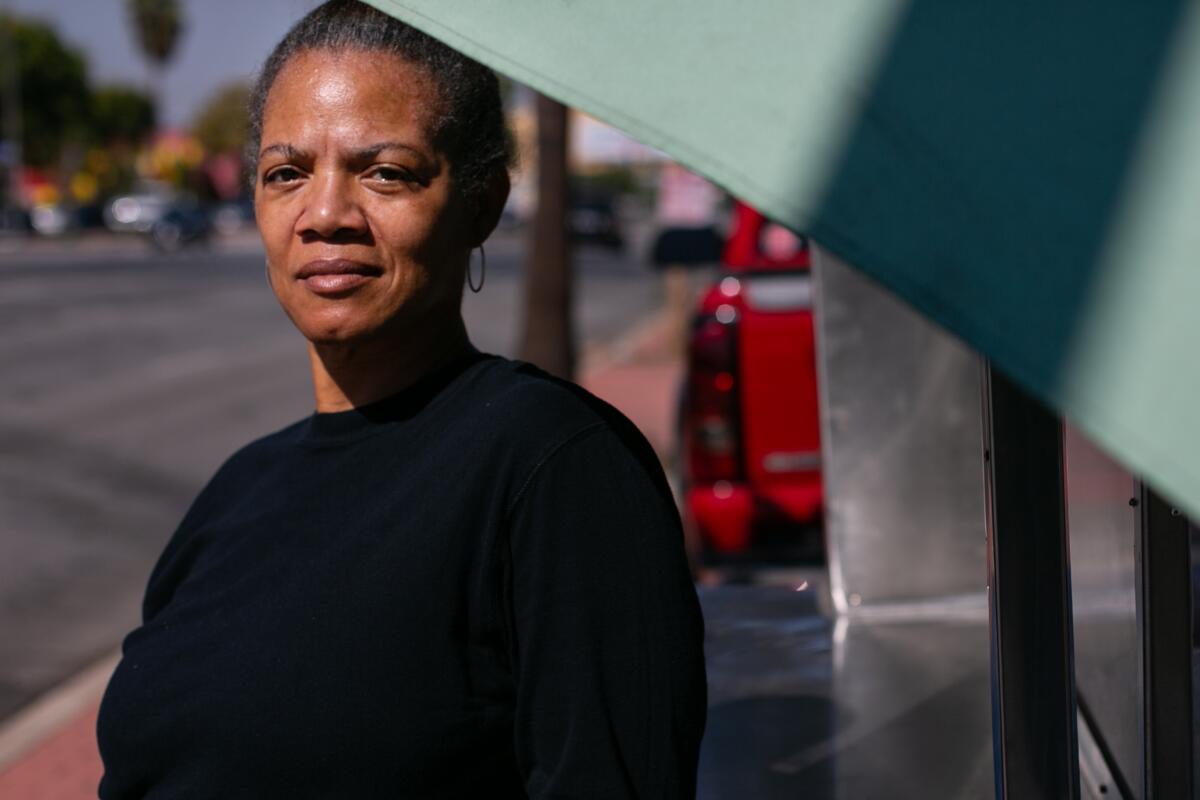
All over the 10th District, the question of Ridley-Thomas’ guilt or innocence was secondary to concern about the implications for L.A.’s remaining Black power base, which many residents perceived as under attack.
“If he is forced to resign, especially now at a time where we’re fighting over district lines and resources for Council Districts 8, 9 and 10 — coupled with so many other things — that could potentially be a huge blow to the district, not just now or for the next few months, but for years,” community activist Damien Goodmon said.
Goodmon, who has engaged Ridley-Thomas on a number of issues over the years, says he and many other Black organizers have struggled with the politician, but overall he’s a significant asset to the Black community.
“Most people who are actually doing the work in the policy field will talk about a complex relationship with him,” Goodmon noted. “Still, he’s done some good things. On the Crenshaw line, he helped get the station at Leimert Park Village. He’s fought for the community in many ways like that.”
The desperation that brought USC dean, Mark Ridley-Thomas together
In Baldwin Vista, David Clark was at a neighbor’s house lamenting the news. Clark grew up in Baldwin Vista in, he said, a network of middle-class families that included the Ridley-Thomases.
“If you’re from West L.A. and you’re Black, it’s a very small world,” he noted. “From Baldwin Hills, Ladera Heights, Leimert Park, Windsor Hills, View Park and Baldwin Village. It’s a very small world, and we all know each other.”
Clark, who inherited his childhood home and other properties in South L.A., perceived the allegations against Ridley-Thomas as part of a greater challenge facing the middle-class Black community the councilman belongs to and represents, one he believes is vulnerable to being underrepresented in politics.
“Do you think we’re getting this seat back once it’s gone?” That was Clark’s refrain all day in conversations with neighbors, family and friends. “People may not know Mark Ridley-Thomas personally, but he’s accessible,” he said. “You can call him and talk to him.”
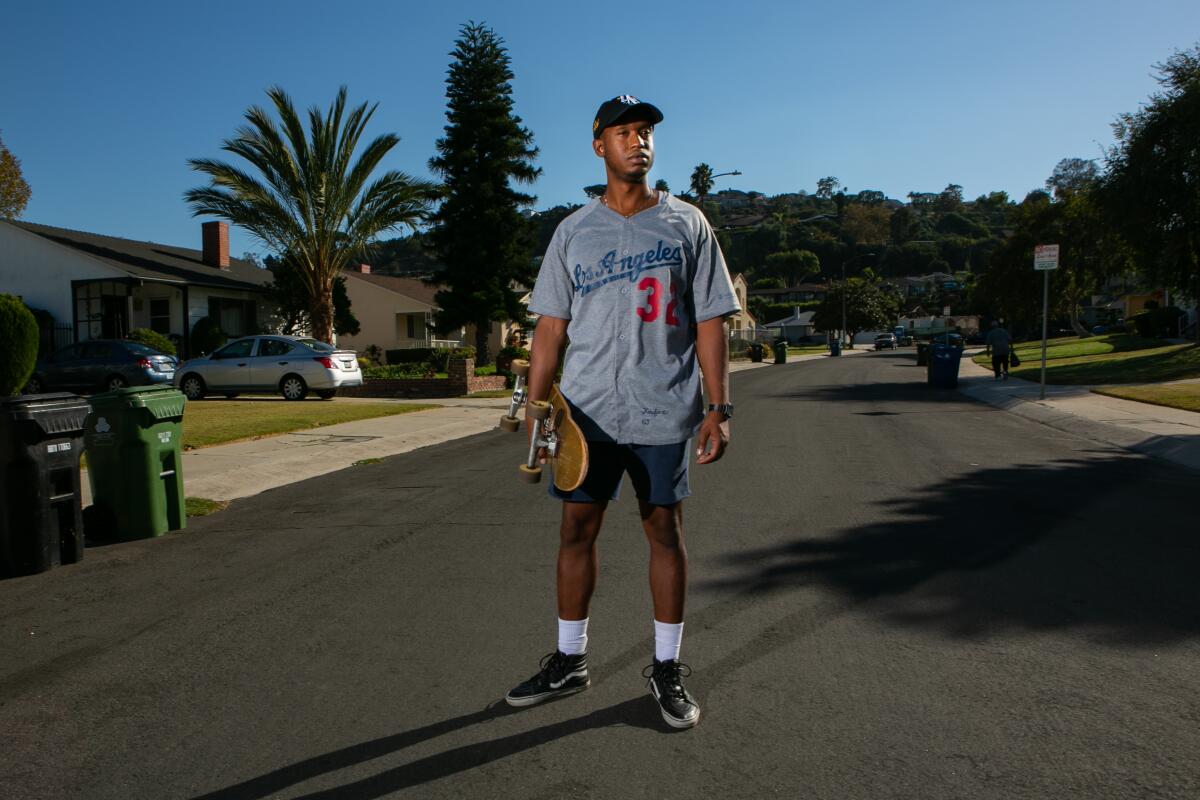
In terms of the threat to his community, Clark points to gentrification and affordable housing in historically Black communities, issues about which Ridley-Thomas had been vocal.
“Baldwin Hills, Baldwin Vista, Baldwin Village were 80% Black in 2000. Now, in 2021, we’re about 40% to 45% Black,” Clark estimated. “These City Council seats are very important to keep our interests at heart and stop that decline.”
With details of the case still scant, speculation regarding the fate of Black L.A. is likely premature. Ridley-Thomas has yet to make a statement and could not be reached for comment.
The desperation that brought USC dean, Mark Ridley-Thomas together
While some elected officials and colleagues have voiced anger and disgust over the allegations, others have come to his defense.
“Council Member Mark Ridley-Thomas has spent his adult life in service to the people of Los Angeles and specifically to South L.A.,” said Councilman Marqueece Harris-Dawson. “There are few people in our community that don’t have a story to recount of a campaign or effort that Council Member Ridley-Thomas led for our advancement, the growth of our representation or to increase our political participation.”
It’s probably not too soon, however, to speculate about what’s next for Ridley-Thomas. The charges against him are detailed with, according to the FBI, a paper trail of emails between Ridley-Thomas, his son Sebastian and Flynn at USC.
“I don’t think he should do any jail time. Community service, fines, find a way to make it right,” concluded Stephens outside the post office. “I don’t think you can find a politician under the sun that hasn’t got a little bit of corruption in him.”
Back at the juice stand, the Whitteds shared the sentiment.
“We don’t want to see anybody go to jail,” said Corey. His father shook his head in agreement. “I doubt that I’d vote for him again,” Michael said, “but he shouldn’t go to jail.”
More to Read
Sign up for Essential California
The most important California stories and recommendations in your inbox every morning.
You may occasionally receive promotional content from the Los Angeles Times.
